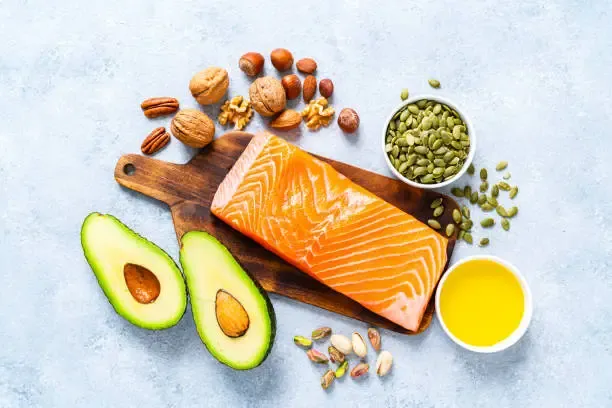The exact cause of polycystic ovary syndrome is not clear, though it may have a genetic component since women with PCOS are more likely to have a mother or sister with the condition. PCOS is typically diagnosed in women in their 20s or 30s, though it can also be identified during adolescence.

What is polycystic ovary syndrome ?
PCOS is caused by an imbalance in female hormones, causing symptoms such as:
- Irregular menstrual cycles
- Skin conditions like acne
- Excessive facial and body hair
- Cysts on the ovaries
- Fertility issues

Polycystic ovary syndrome and weight gain
If you have PCOS, your body produces an excess of androgen hormones. This can lead to weight gain, particularly around the abdomen, which may increase the risk of:
- High cholesterol
- High blood pressure
- High blood sugar
- Elevated triglycerides
- Heart disease
- Type 2 diabetes
Sugar and polycystic ovary syndrome
PCOS is also associated with insulin resistance. When we consume carbohydrates, the pancreas secretes a hormone called insulin, which allows sugar to enter our cells and produce energy for the body. However, with insulin resistance, cells become less responsive to insulin’s action.
In practice, it’s essential to choose low-GI carbohydrates: dried legumes (like chickpeas, lentils, kidney beans, and fava beans), sweet potatoes (instead of regular potatoes), whole or semi-whole basmati rice, al dente pasta, and muesli for breakfast. This helps stabilize blood sugar and reduces hyperinsulinemia
Tips for maintaining a healthy weight with polycystic ovary syndrome
There is no specific diet to prevent or treat polycystic ovary syndrome. However, making the right food choices and staying active can help manage long-term complications.
The best diet for someone with PCOS is one that reduces the risk of diabetes and heart disease. This diet should be low in saturated fats and high in fibre.
the right fats

Excess consumption of saturated and trans fats can lead to high blood pressure and cholesterol. Opt for healthier unsaturated fats found in:
- Vegetable oils like canola and olive oil
- Avocados
- Nuts
Increase fibre intake :

Eating more fibre can help regulate blood sugar and lower cholesterol. Fibre is also beneficial for digestion and helps you feel full. Whole Grains: Oats, brown rice, whole wheat, quinoa, barley, and buckwheat
· Vegetables: Peas, spinach, squash, and broccoli
- Legumes: Lentils, chickpeas, soybeans, and common beans
- Fibre-Rich Cereals: Made from wheat bran, psyllium, or whole oats
- Nuts and Seeds: Almonds, flaxseeds, and sunflower seeds
· Fruits: Berries, pears, oranges, figs, and kiwis
Avoid processed foods, as they are often high in sugar, salt (sodium), refined flour, and unhealthy fats, such as:
- Packaged cookies, desserts, muffins, and granola bars,
- Take-aways like pizzas and burger, hot dogs …
- Fizzy drinks like soda and sweetened drinks
- Fried foods like fries and chips
- Sweets, pastries . Avoid high glycemic index (GI) foods, sweets, sugary drinks, products made with refined flour, and white rice. These foods cause blood sugar spikes and stimulate insulin production.

Exercise regularly
Aim for 3 hours of moderate-intensity exercise per week. Start with short sessions and gradually increase the duration as your body will gradually adjust.
how can a dietician help with polycystic ovary syndrome ?
A dietitian can:
- Analyse your body composition and check its evolution
- design a personalized meal plan to manage PCOS symptoms while considering your preferences, medical history, culture, and lifestyle
- Ensure you consume enough essential nutrients
- Recommend beneficial supplements

Conclusion
There is no specific diet to prevent or treat PCOS. However, adopting a nutritious, balanced routine and staying active will help manage reduce symptoms and long-term complications like heart disease and diabetes. But it is essential to keep the pleasure element in your diet !
Taking care of your diet is essential for weight management and weight loss when dealing with Polycystic Ovary Syndrome (PCOS). However, focusing on diet alone is not enough. Exercise and training are equally crucial if you want to maintain your weight loss over the long term.
That’s why I've partnered with Morgan, a skilled physiotherapist and personal trainer based at Excellence Physiotherapy and Mummy’s Physio in London. Morgan has also battled PCOS (lost 25kg) and understands the challenges of weight management. Because of her PCOS journey she created an unique exercise
programs and training routines specifically for women with Polycystic Ovary Syndrome (PCOS). She is now the PCOS physio / Personal Trainer weight loss specialist in London.
Through her own experience, research, and extensive training, Morgan has developed this efficient exercise program that delivers outstanding results. If you're looking for the ultimate combination to achieve your weight loss goals and maintain a balanced weight, Morgan is here to help.
For more information on how to get started with her PCOS weight Management exercise program, feel free to contact her at Excellence Physiotherapy and Mummy’s Physio in London.
Tel: 07824553765 or
Directly from the Website : https://www.mummysphysio.com
You can read Morgan’s article about her weight loss exercises program by clicking:
Physiotherapy and Personal Training PCOS Weight Management



